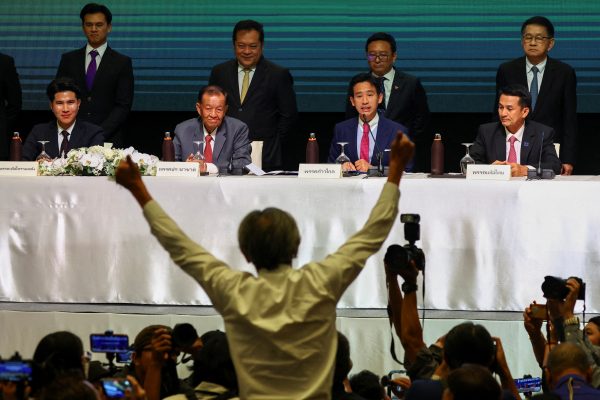To the surprise of some, however, it was not the long-time antagonists of the conservative elite, the Pheu Thai party aligned with former prime minister Thaksin Shinawatra’s political clan, who came in first. Instead, the liberal Move Forward party stormed to a commanding lead with around 152 seats in the lower house, with Pheu Thai placing a creditable second on 141. The leading government party Palarang Pracharat was smashed, winning only 41 seats, while the United Thai Nation Party claimed a mere 36.
The face of the opposition to Thailand’s establishment has changed, and that change makes the task of placating the royalist–military axis somewhat harder. A détente between the Thaksinists and the military is conceivable, if unlikely, but Move Forward is unlikely to compromise on its promise to amend the lèse-majesty provisions in the Thai criminal code that forbid any real criticism of the monarchy.
The Thai old guard is unlikely to make way quietly for a party that has pledged to undo much of its power. They have, roughly speaking, two possible methods for keeping Move Forward’s Pita Limjaroenrat from becoming Prime Minister: the constitutional and the extra-constitutional. The former is for the moment more likely; regardless, as Jacob Ricks explains in this week’s lead article, ‘multiple dangers abound for Pita and Move Forward, threatening his chance at the Prime Minister’s chair.’
Under the current constitution, the prime minister is chosen by both the lower house — in which the Move Forward-led coalition, which also includes Pheu Thai, holds a notional majority after the 19 May election — and the entirely junta-appointed Senate. The coalition for the moment does not have enough votes to install Pita as prime minister if the Senate votes en bloc against him. As Ricks suggests, ‘[i]f Pita is unable to garner sufficient support to become prime minister, the prime ministership could fall into the hands of Pheu Thai, and Thai media has speculated that a Pheu Thai government may be willing to drop Move Forward from its coalition to garner support from the senate.’
Moreover, the Election Commission, which is under the thumb of the current government, could try to wreak havoc through its ability to annul results if it determines that electoral rules were broken. Despite the undeniable mandate that a Move Forward–Pheu Thai coalition would have to rule, it is still quite possible that the conservatives will find a way under the army-drafted constitution to keep at least Move Forward out of a future government.
If the coalition manages to peel away enough senators to elect Pita, however, the army and its allies will be faced with a much more serious dilemma. Will it, for the fourteenth time in a century, use its muscle to overthrow the government?
The most important element of democracy is the consent of the loser. This consent is usually founded on the implicit belief that neither government nor opposition is a permanent state of affairs for any major party. Successful transitions from military to durable civilian rule in Asia have usually taken place when the incumbents felt they could remain competitive in free and fair elections — a belief that made it safe for ruling cliques in South Korea and Taiwan to concede democratic reforms in the 1980s and 1990s. In Indonesia, too, the successful transition to democracy after the fall of Soeharto in 1998 was partially secured by the realisation among the leaders of his former party, Golkar, that they stood a good chance of maintaining some power through the ballot box.
But in Thailand, the situation seems different, and for the conservative elite, the question is an almost existential one. No matter how hard they try, theirs is a brand the Thai people seem resolutely uninterested in buying. In every election since 2001, voters have rejected them. While the military has denied that there is any chance of another coup, as Ricks points out, that is exactly what Prayuth said prior to the coup in 2014 too.
Any military intervention would have potentially explosive effects for Thai society and damaging consequences for its economy. It would also present major dilemmas for ASEAN, which would rather stick to its long-standing principle of non-interference in the affairs of member states but has set a precedent about the limits of political backsliding it is willing to tolerate among its members. It downgraded Myanmar’s participation in ASEAN meetings after the ouster of the elected National League for Democracy (NLD) government via military coup in 2021.
A similar coup in Thailand is the last thing ASEAN needs now as it seeks to shore up its relevance internationally — a message which should be, and hopefully is, being quietly but clearly made to Thailand’s military through diplomatic channels.
The EAF Editorial Board is located in the Crawford School of Public Policy, College of Asia and the Pacific, The Australian National University.

